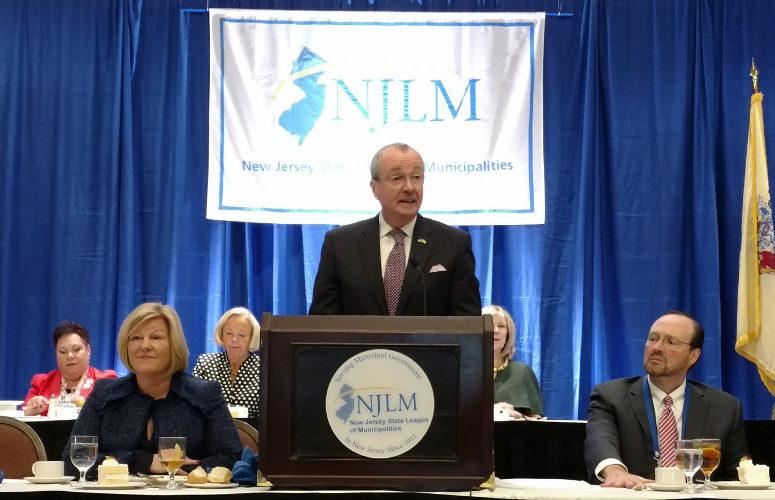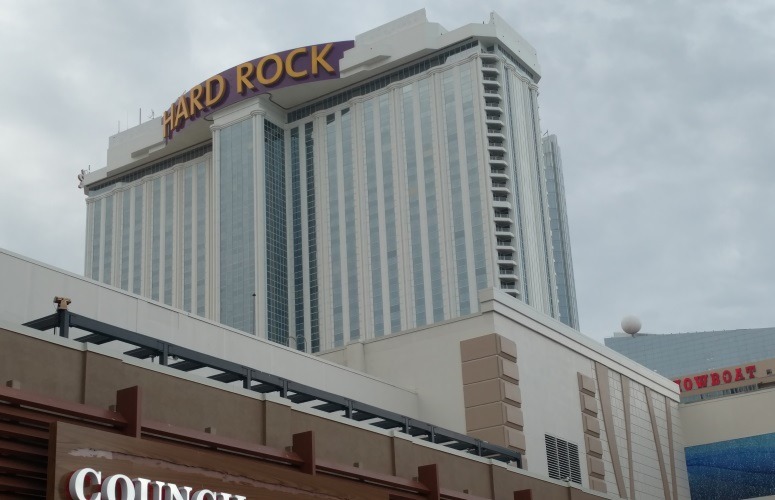
Murphy Discusses Cost Savings and More at League Luncheon
By Anthony Birritteri, Editor-in-Chief On Nov 21, 2019Before a crowd of local, county and state political leaders – as well as business executives – Gov. Phil Murphy outlined his administration’s almost two-year achievements at today’s League of Municipalities’ Delegates Luncheon at the Sheraton Hotel, Atlantic City.
Touching upon property taxes, shared services, public employee healthcare cost savings, increased school aid, an increase in Department of Transportation municipal aid grants, and pending changes to the state’s corporate tax incentive programs, the governor said his time in office “has a record of accomplishment that I put up against any previous administration and any other state.”
He began his speech by noting the country’s – and even parts of the state’s – political divisiveness by saying that people “have retreated to deeply blue or deeply red corners.” However, quoting President John F. Kennedy, Murphy said, “Let us not seek the Republican answer or the Democratic answer, but the right answer.”
Though it is often mentioned that Murphy lacks a strong working relationship with Senate President Steve Sweeney and Assembly Speaker Craig Coughlin, the governor said that he was proud of his accomplishments so far and the work his administration is undertaking with Sweeney, Coughlin and the Legislature in general.
On the goal of driving down property taxes, Murphy cited his administration’s reining in one of the largest drivers of municipal property tax increases – healthcare costs. “We worked alongside our partners in organized labor to put real healthcare savings into the state budget, and, as a result, premium rates for local government and school employees are going down in the vast majority of your communities,” he said.
Another initiative in lowering or at least stabilizing property taxes is implementing shared services between local governments. To that end, Murphy said that over the past year, his administration built capacity at the Department of Community Affairs (DCA) to work with [towns] on furthering shared service ideas to bring them to completion. He discussed the DCA’s new Local Assistance Bureau (LAB) that provides free, on-site, and hands-on technical assistance in areas such as budget, bond, and local public contracts law, risk management, civil service, among others.
Additionally, he said that the FY 2020 state budget provided $10 million for shared services and school district consolidation study and implementation grants.
On Department of Transportation (DOT) municipal aid grants, Murphy said he was proud of delivering more of such aid than ever before. “DOT is now distributing that funding in alignment with your planning needs, so you can get money in hand more efficiently and get projects paid for more effectively,” he told the audience.
He said DOT will soon release $160 million-plus in municipal aid grants that will be “synched-up” with municipal calendars and construction plans, so that money will hit the streets in time to get shovels in the ground this spring.
“More than 540 municipalities – that’s nearly 96 percent of our communities – will be receiving a DOT municipal aid grant,” he said. “All totaled, we will have distributed $1.2 billion over the past 18 months.”
On transit village development, Murphy said that NJ TRANSIT is reviewing its real estate portfolio to identify parcels that are ripe for such developments. Along the same lines, he touched upon signed legislation enabling municipal land banks to help municipalities turn “empty and overlooked properties into places where neighborhoods can rise.”
He said his administration is also taking a strong position on promoting Opportunity Zones, and mentioned the Opportunity Zone Challenge “to ‘incent’ communities to engage in smart, forward-looking planning,” he said.
On revamping the state’s tax incentive programs, the governor said he is confident that a new system of initiatives will be implemented. “This is just as important to the towns along the Route 24 corridor in Morris County as it is to the City of Camden or anywhere else,” said Murphy as he thanked Sweeney and Coughlin for their willingness to engage in “thoughtful discussions over the past several months” on the issue.
“It’s no secret that there are very strong opinions on this issue,” the governor continued. “But, at the end of the day, we all want the same thing – a sustainable system that will allow for the innovation economy to fully take root here, that will grow jobs and economic opportunity, and that will spur inclusive revitalization.”
Earlier in the day, Murphy held a briefing with 30 elected officials in Atlantic City to outline his proposed incentive plan. The plan, first proposed in October 2018, would cap the state’s incentives programs, while still providing for economic development. The proposal also includes provisions for the support of organized labor, as well as several anti-corruption measures to ensure that all taxpayer money is accounted for and incentive applicants provide for all jobs and benefits called for in their approvals.
Additionally, the new program offers provisions to specifically benefit a number of New Jersey cities including Newark, Trenton, Paterson, Atlantic City, and Camden, providing incentives for both brownfields and historic building redevelopment.
He closed his remarks by saying he is committed to governing as he has been: “Honestly, humbly, and in partnership.”
To access more business news, visit NJB News Now.
Related Articles:





